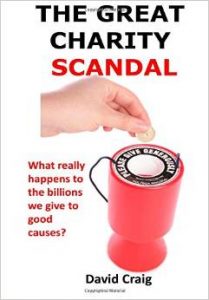It’s Christmas. For families it’s the time for giving. For charities and their fatcat bosses, it’s the time for taking.
It seems that half the ads on TV at the moment are from charities asking, begging, demanding that we send them our money.
The most popular wheeze this year seems to be asking us to text a word like “hat” (UNICEF) or “blanket” or “water” or whatever in order to donate just �3 or �5. It sounds so simple, doesn’t it? And it seems such an easy way to help those less fortunate than ourselves.
But why do the charities want our �3 or �5? Do you really believe that our �3 or �5 even covers the cost of making and screening the TV ads? Usually it doesn’t. What many charities are really up to is harvesting our mobile phone numbers. So, once you’ve naively texted your �3 or �5, you’re put on the “suckers list” and your mobile number will be passed onto a professional tele-sales call centre. Then you’ll be called up relentlessly. The caller will claim something like “we see you’ve already helped charity x, would you consider starting a direct debit so you can contribute every month?”�
An ad for workers at one such call centre explained “The role involves calling individuals who have already expressed an interest in the campaign you are working on and securing additional funds in a warm, friendly and persuasive manner”
The person calling you will be on a minimum salary. But they will be able to at least double their earnings if they can reach their targets for the number of direct debits they get opened every day. If they consistently don’t reach their targets, they get fired.
This chasing people who have unknowingly given their mobile phone number is big business. Around 800,000 people sign up to these charity direct debits every year. There are between 20 and 30 of these tele-sales operations making over ten million of these calls every year. Just one call centre claimed it made 1,250,000 calls in one year – about 24,000 calls a week. Most of the executives owning these call-centre companies, supposedly working to raise money for charities, are multi-millionaires.
How do I know this? Let me take you through some simple arithmetic – here it’s for a street chugger:
A typical chugger (charity mugger) gets paid around �7.50 an hour. In a 6-hour shift they’ll have a target of about 20 texted donations of �3 to �5. So, in a 6-hour shift they’ll collect between �60 to �100 in texted donations and get paid about �45 (plus bonuses if they hit their targets). But their employer will be getting around �15 an hour from the charity – �90 a day. So, all the �3 to �5 texted donations go into the pockets of the agency raising money for the charity. It’s only when the tele-sales call centre swings into action that these is some money actually raised for the charity.
But even here the situation isn’t great. The fundraising company typically gets about �80 to �120 for each direct debit. This means that, if you are cajoled into signing a direct debit for say �5 a month, almost the first two years’ donations go to the fundraising company and never reach the charity.
It’s the same story with the charities’ TV ads – owners of fundraising companies get rich and your chosen charity gets just a small fraction of any money you give.
If you want to help others, give generously to small local charities with no chuggers, no TV ads, no tele-sales call centres, no overpaid, over-pensioned bosses, no fancy offices.
But avoid the large national and international charities – the only people they help are themselves!
And here’s a short (3 minutes) video I made:















�3 to �5 David. Your out of date. Recent ads on the TV are asking for �19. I have no idea why the chose �19. Maybe the public are so gullible now they just throw money at them.
Yes, the Salvation Army is asking for �19. The reason is that they think it sounds less than �20, in the same way as shops put prices at say �39.99 instead of �40.
But most of the other advertising charities are still going for the �3 or �5 text in order to ‘harvest’ your mobile phone number so they can then subject you to the ‘hard sell’ again and again and again. Plus they can make even more money by selling on your mobile phone number to other charities and businesses.
Thank you for this great revelation. I worked for the two charities Doctors without Borders and Terre des Hommes. And I quit because of the chuggers. The chugging firms are making “profit with NON-Profit”, which is a complete ethical contradiction. And another important thing: These campaigns are more and more expensive for the non-profit-organizations, because less and less people are signing (last year, at least 5 face-to-face agencies went into administration). That means it takes longer and longer, untill the costs of a campaign is paid back; in the meantime 2-3 years. So a donor paies the first 2-3 years� donations to the chugging agency. It’s a scandal, that politics doesn’t stop all this nonsens in the charity sector. Why? Because a lot of politicians are directly in or linked to non-profit-organizations themselves (David Miliband, the brother from Ed Miliband, for example, is CEO of the International Rescue Committee)!
I give only to the NHS Blood donation charity, 100% goes to the needy.
Lionel Dickerson